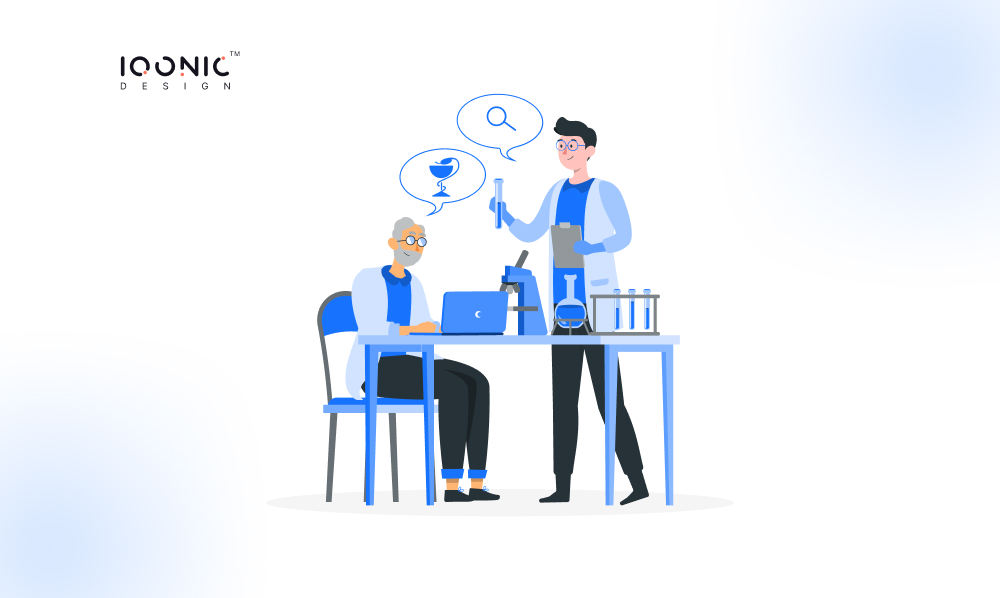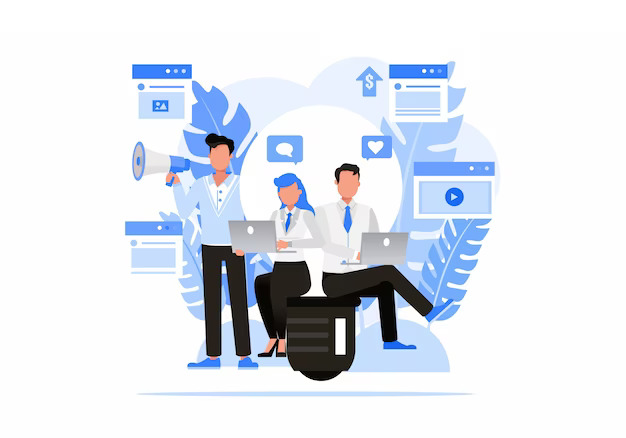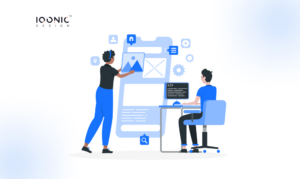
Outsource Healthcare Software Development: Best Practices and Cost
Technological innovation is pivotal in enhancing patient care, streamlining processes, and enhancing efficiency. Healthcare organizations are increasingly turning to outsourcing to meet the growing demand for healthcare software development.
Outsourcing healthcare software development involves collaborating with external experts to design, develop, and maintain key software solutions. Due to its potential to revolutionize healthcare, this practice has gained significant traction in recent years.
This blog will focus primarily on cost considerations and best practices for outsourcing within the healthcare sector.
Benefits of Outsourcing Healthcare Software Development

1. Enhanced Focus on Core Functions
In the healthcare industry, where every moment counts, outsourcing healthcare software development allows organizations to allocate their valuable resources where they matter most: patient care. By partnering with specialized Top software development company, healthcare providers can delegate the intricate and time-consuming task of software creation, freeing up their in-house teams to concentrate on delivering exceptional healthcare services. This increased focus on core functions improves patient satisfaction and fosters organizational innovation.
2. Access to Specialized Expertise
Healthcare software development requires a thorough understanding of the industry’s unique regulations and compliance rules. Healthcare organizations benefit from outsourcing when they access highly skilled healthcare software developers. These experts are well-versed in industry-specific challenges, ensuring the creation of efficient and compliant solutions.
Stay tuned as we explore additional benefits, challenges, best practices, and cost considerations associated with outsourcing healthcare software development in the upcoming sections of this blog.
Challenges in Healthcare Software Development
Developing software for the healthcare industry presents unique challenges that require careful consideration:
1. Stringent Compliance and Security Demands:
Healthcare is subject to strict regulations like HIPAA (Health Insurance Portability and Accountability Act) in the United States. Healthcare software must adhere to these standards to protect sensitive patient data, making compliance a top priority.
2. Interoperability Issues:
Healthcare systems often consist of various applications and databases that need to communicate seamlessly. Ensuring interoperability among different software components can be a complex endeavor.
3. Data Privacy Concerns:
Maintaining robust data privacy measures is critical with the ever-increasing volume of patient data. Any breach can have severe consequences, legally and regarding patient trust.
4. Constant Technological Advancements:
The healthcare field continuously evolves with new treatments, diagnostics, and technologies. Healthcare software must adapt and integrate these innovations, posing a challenge for developers.
5. User-Friendly Interfaces:
Healthcare professionals need software that is easy to navigate and doesn’t disrupt their workflow. Designing intuitive user interfaces for healthcare software is crucial.
Addressing these challenges requires specialized expertise in healthcare software development, a deep understanding of regulatory requirements, and a commitment to data security.
Choosing the Right Outsourcing Partner

Selecting the right outsourcing partner is pivotal to the success of your healthcare software development project. Consider these key factors:
1. Experience in Healthcare:
Look for a partner with experience in healthcare software development. They should have experience with EHRs and telemedicine platforms.
2. Reputation and Reviews:
Research the reputation of potential partners. Online reviews, testimonials, and case studies can provide valuable insights into their previous projects and client satisfaction.
3. Domain Knowledge:
A deep understanding of the healthcare domain is essential. Your partner should know industry-specific challenges, compliance requirements, and best practices.
4. Compliance Expertise:
Given the importance of compliance in healthcare, your outsourcing partner must have expertise in regulatory standards like HIPAA, GDPR, or FDA guidelines, depending on your region.
5. Scalability:
Ensure your partner can scale resources as needed to meet the evolving demands of your project.
6. Communication Skills:
Effective communication is crucial for a successful partnership. Ensure your partner can communicate promptly and in a language you understand.
7. References and Case Studies:
Request references from previous clients and review case studies of similar projects they’ve completed. This provides firsthand insights into their capabilities.
By considering these criteria, you can confidently choose an outsourcing partner who aligns with your healthcare software development goals and ensures the success of your project.
Best Practices in Healthcare Software Development Outsourcing
Outsourcing healthcare software development can be a strategic move, but success relies on the following key best practices:
1. Project Planning and Management:
2. Communication Strategies:
3. Quality Assurance and Testing:
Rigorous quality assurance and testing are non-negotiable. Thoroughly test software for functionality, security, and compliance. Involve end-users or healthcare professionals in usability testing to identify and address issues early.
4. Compliance and Security Measures:
Adherence to healthcare regulations and data security is paramount. Ensure your outsourcing partner understands compliance standards like HIPAA, GDPR, or FDA guidelines and incorporates robust security measures throughout development.
Following these best practices can mitigate risks, ensure project alignment, and ultimately deliver a healthcare software solution that meets your organization’s needs and industry standards.
Cost Considerations in Healthcare Software Development Outsourcing
Cost plays a pivotal role in outsourcing decisions in healthcare software development:
1. Budget Constraints:
Healthcare organizations often operate under budget constraints. Outsourcing allows them to access top-notch development talent without the overhead costs of hiring an in-house team.
2. Factors Influencing Cost:
Several factors influence the cost of outsourcing, including project complexity, scope, timeline, the expertise of the outsourcing partner, and location. Offshore outsourcing can offer cost savings but may require more extensive communication efforts.
3. Strategies for Cost Optimization:
Clear Scope Definition:
Ensure a well-defined project scope from the outset. Changes mid-project can lead to cost overruns.
Choose the Right Partner:
Select an outsourcing partner with the right expertise and reputation to minimize the risk of costly mistakes.
Flexible Resource Allocation:
Opt for a partner that allows for flexible resource allocation. You can scale up or down based on project needs.
Offshore vs. Onshore:
While offshore may offer cost savings, onshore outsourcing may provide better language and time zone alignment.
Value Over Price:
Focus on the value delivered rather than just the price. Cutting costs too aggressively can compromise quality and result in long-term expenses to fix issues.
Balancing cost considerations with quality is essential. An ideal approach is to strike a balance that aligns with your organization’s financial capabilities while ensuring the successful delivery of a reliable healthcare software solution.
Case Studies or Examples
Real-world examples of successful healthcare software development outsourcing projects illustrate the tangible benefits:
1. Case Study 1: Electronic Health Records (EHR) System
A major healthcare facility outsourced the development of its EHR system to an experienced partner. The result was a streamlined, user-friendly system that improved data accessibility and reduced administrative burdens. This led to enhanced patient care, increased efficiency, and compliance with industry regulations.
2. Case Study 2: Telemedicine Platform
A telemedicine startup partnered with a specialized outsourcing team to build a telehealth platform. The outcome was a cost-effective solution that enabled remote consultations and expanded the reach of healthcare services. The platform saw rapid adoption and positively impacted healthcare accessibility, especially in rural areas.
These case studies highlight how outsourcing healthcare software development can yield solutions that enhance patient care, optimize operations, and ensure compliance.
Future Trends in Healthcare Software Development Outsourcing
As healthcare continues to evolve, outsourcing will play a pivotal role in keeping pace with emerging trends:
1. AI Integration:
Artificial Intelligence (AI) is increasingly used in diagnostics, patient monitoring, and data analysis. Outsourcing AI development can accelerate the integration of AI-powered solutions, improving decision-making and patient outcomes.
2. Telemedicine Expansion:
Telemedicine is here to stay, especially after its widespread adoption during the COVID-19 pandemic. Outsourcing will help healthcare organizations scale their telemedicine offerings, making healthcare more accessible.
3. Remote Patient Monitoring:
With the rise of wearables and IoT devices, remote patient monitoring is rising. Outsourcing can facilitate the development of secure, data-driven solutions that enable proactive healthcare management.
These trends will shape the future of healthcare software development outsourcing, driving innovation and improving patient care.
Conclusion
In the dynamic landscape of healthcare, outsourcing healthcare software development emerges as a strategic imperative. This blog has highlighted the significance of best practices and cost considerations in this process.
Outsourcing allows healthcare organizations to focus on core functions, access specialized expertise, and address unique industry challenges. However, success hinges on meticulous project planning, robust communication, rigorous quality assurance, and unwavering compliance.
As the healthcare industry embraces outsourcing, it must remain attuned to future trends such as AI integration and telemedicine expansion. By leveraging these trends, healthcare organizations can stay competitive, offer superior patient care, and remain at the forefront of technological innovation. We encourage healthcare organizations to explore outsourcing opportunities to navigate these exciting developments and secure a healthier future for all.
Unlocking Success in Healthcare Software Development: Outsource with Iqonic Designs
Are you ready to develop healthcare software but concerned about costs and best practices? Look no further! Iqonic Designs is your trusted partner in healthcare software development, and we’re here to guide you through the process.
Why Outsource to Iqonic Designs?
1. Cost-Effective Solutions:
We understand the importance of cost efficiency in healthcare. With us, you can expect affordable yet high-quality healthcare software development.
2. Expertise in Healthcare:
Our team of Flutter experts is well-versed in healthcare software. Whether it’s a Doctor on Demand app or any other healthcare solution, we’ve got you covered.
3. Result-Oriented Approach:
We are result-oriented and committed to delivering solutions that work. Your success is our top priority.
Best Practices in Healthcare Software Development:
User-Centric Design:
We prioritize user experience to ensure your healthcare software is intuitive and patient-friendly.
Cross-Platform Excellence:
We specialize in developing cross-platform healthcare apps that are both visually appealing and efficient.
Robust Backend:
Our powerful APIs and backend systems provide the foundation for successful healthcare software.
Effective Communication:
Technical Expertise:
Leave the technical details to us. We’ll handle cloud hosting and app uploads, making your healthcare software accessible.
Ongoing Support:
Healthcare software needs regular updates, and we’re here to ensure your software remains current and secure.
Outsourcing healthcare software development doesn’t have to be a headache. With Iqonic Designs, you get the best of both worlds – top-notch expertise and cost-effective solutions. We’ll walk you through the best practices while keeping your budget in check.






